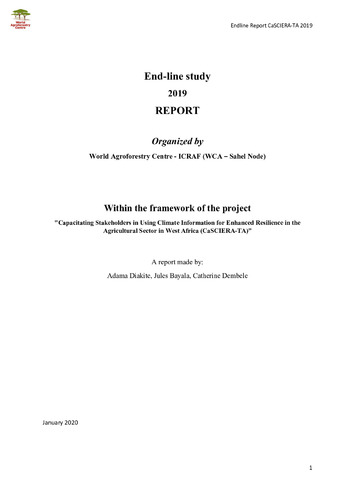End-line study - Capacitating Stakeholders in Using Climate Information for Enhanced Resilience in the Agricultural Sector in West Africa (CaSCIERA-TA)
Abstract
In the context of increasing climate variability and uncertainty, access to and use of reliable
climate information to inform decisions in the agricultural sector are becoming instrumental to
strengthen farmers’ resilience to climate shocks. World Agroforestry Centre (ICRAF) and
partners, Climate Change Agriculture and Food Security (CCAFS), AGRHYMET, California
Academy of Sciences (CAS), « Institut National des Recherches Agricoles du Bénin »
(INRAB), « Institut de Recherche Agronomique de Guinée » (IRAG), « Institut National de la
Recherche Agronomique du Niger » (INRAN), « Institut Togolais de Recherche
Agronomique » (ITRA), and national coordination unites component West African Agricultural
Productivity Program (WAAPP) of the four countries involved (Bénin, Guinée, Niger and
Togo), have implemented a project called “Capacitating Stakeholders in Using Climate
Information for Enhanced Resilience in the Agricultural Sector in West Africa” (CaSCIERAWA). The project was funded by CORAF through the regional coordination of WAAPP and by
the four countries through the national coordination units of the WAAPP.
The monitoring, evaluation and learning component aimed at assessing the progress made by
the various components of the project by comparing their final achievements measured by a set
of indicators with a baseline situation of the same indicators to reveal the extent to which the
project objectives have been reached. To this end, the baseline study consisting of establishing
the critical situation before the project implementation was conducted in 2018. At the end of
the project and according to the monitoring and evaluation plan, an end of project study was
conducted from September to November 2019 within the four countries: Benin, Guinea, Niger
and Togo. The present document reports the findings emanating from comparing the before and
after situations for a certain number of variables. As only few variables have been considered,
a more complete report of the full variables will be produced later.

